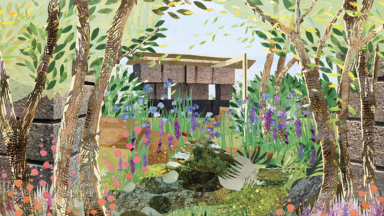
Garden designer and botanist Sophie Parmenter, and the Director of CSK Architects Dido Milne, have designed a garden to explore an autistic person’s experience, particularly the use of a strategy called ‘masking’.
The term masking describes how autistic people consciously or unconsciously hide their autistic characteristics, in order to fit in and feel more accepted. Masking autistic characteristics and suppressing coping mechanisms can result in distressed behaviour, exhaustion, mental health difficulties, a loss of sense of self and low self-esteem.
The garden, sponsored by Project Giving Back, features walls of cork to create a series of spaces dedicated to different types of social interaction – at work, with friends and family, with partners, and with ourselves. The cork ‘masks’ encircle a central sanctuary with a mesmeric kinetic sculpture, alluding to the inner mind’s complexity and beauty.
Designer Sophie Parmenter explains: “The three outer spaces in our garden, each with its own character, accommodate a type of social activity: a large, covered space for a family or friends; a more formal space for colleagues; and a more intimate corner for a quiet conversation with a partner. Each space is defined by a cork and timber screen – or ‘mask’ – which together create a fourth area, a sunken, protected sanctuary at the heart of the garden. This sheltered central garden becomes a metaphor for the inner mind. RHS Chelsea Flower Show offers an opportunity to break new ground as a designer, enjoying the creative freedoms involved in making a show garden. It also affords a chance to challenge the industry’s traditions and to push for innovation in sustainable design.”
The planting scheme is multi-layered, evolving from wetland meadow to river birch woodland, with a vibrant colour palette at its boundary soothing to softer hues at its heart, textured curling bark sits alongside large crusted blocks of expanded cork. A strong ecological ethos runs through the garden, showcasing the circularity of regenerative systems and the interdependent relationship between natural ecosystems and man-made materials.
Dido Milne, of CSK Architects, explains how material life cycles which lie behind the materials we build with are all too often hidden from view. “On the face of it, a building appears to be a big stable object that is permanent, but this façade masks the reality that like everything else we make, a building is both constantly changing and temporary – a lot of buildings don’t last much longer than a human lifespan before they are demolished. Scratch the surface some more, and in fact the built environment is part of a never-ending flow of materials across time – extraction, manufacturing, construction, maintenance, repair, reuse and renewal – all of which can create environmental impacts. This garden is an opportunity to explore and highlight some of the hidden connections between the materials we specify and the ecosystems which lie behind them.”
There is a large team collaborating on the project, including autistic people and people who have family or friends who are autistic. Autistic people are involved in developing the message and ethos of the project, as well as the creation of the garden itself. Landform Consultants will be managing the build.
After the show, the garden will be relocated to a National Autistic Society supported living site at Catrine Bank – alongside the river Ayr in Scotland. Catrine Bank is home to around 35 permanent or temporary residents and more than 250 staff who support them, and work in offices on site. Residents need garden spaces to enjoy and staff need gardens to rest in during breaks, and they all need spaces to socialise with visiting friends, family, and the wider local community.

